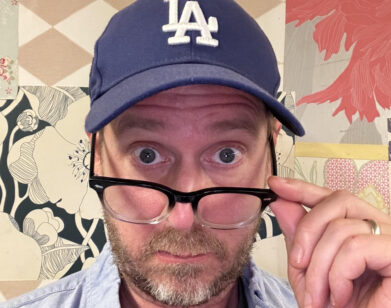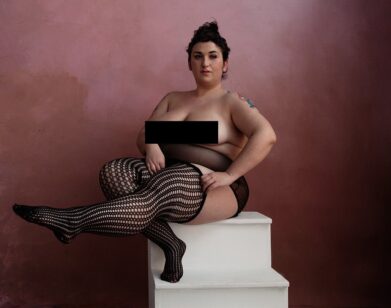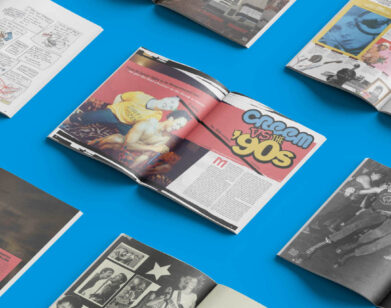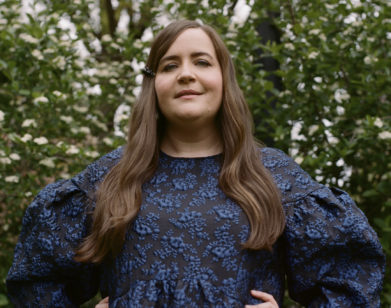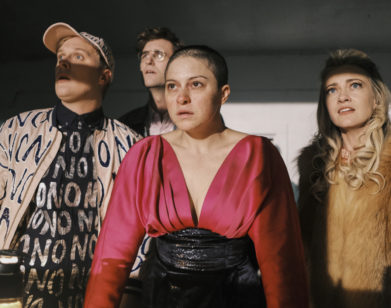IN CONVERSATION
To Amen Dunes and Patti Harrison, Comedians and Musicians Are Kindred Spirits

Amen Dunes, photographed by Michael Schmelling.
When Damon McMahon, aka Amen Dunes, ran through the list of people he had in mind to talk to about Death Jokes, his first album release in six years, he considered the usual suspects: Whoopi Goldberg, Martin Shkreli, Tom Cruise. But Dunes, a longtime comedy buff, landed on the comedian and actress Patti Harrison, drawn to the abstract and often absurd way she lampoons contemporary culture. Musicians and comedians, he posited, might have more in common than you’d think. Also featured on his new record is an array of comedy titans, including Lenny Bruce and Richard Pryor, whose stand-up clips are interpolated. “This album is me trying to talk about all this shit that no one wants to talk about, all the little stuff that goes on between the lines,” he told Harrison on a Zoom call earlier this month. “It’s my version of being political.” In conversation, the two talk Tim & Eric, the state of the music industry, and address the Angophile allegations.
———
AMEN DUNES: Hey, Patti.
PATTI HARRISON: Hey. Can I call you Damon?
DUNES: Yeah.
HARRISON: I didn’t know if you wanted me to call you Dunes, which I’m happy to do. I don’t want to dead name you. Well, thanks for having me on. Real quick, what inspired you to ask me to be the first interview you did?
DUNES: That’s a good question. Actually, the first question is, what are we doing? Are we supposed to just talk about random stuff?
HARRISON: I did an interview for Interview Magazine once that was profiling me. I was in the same boat where I thought it was about two artists interviewing each other equally. The person who interviewed me was Tim Heidecker. So I’m the Tim Heidecker here. I’m interviewing you and we’re going to explore whatever you want to talk about, really. It doesn’t have to be about your new album. I think that’s an exciting thing to talk about, but you could also talk about any diseases or anything that you’re currently struggling with.
DUNES: I’m very, very, very sick and I’m dying.
HARRISON: That’s TMI and I cannot hold space with you on that.
DUNES: I thought we’d just randomly talk, which could go very wrong.
HARRISON: The conversation could veer into something that’s deeply painful for both of us, and then we could spiral about it in a way that makes us lose track of time–
DUNES: An outpouring.
HARRISON: A slow outpouring of inner bile and abscesses leaking into the public sphere.
DUNES: They were like, “Who should we ask?” So I asked about all these ridiculous people.
HARRISON: Whoopi Goldberg? Martin Shkreli?
DUNES: Yeah, exactly.
HARRISON: Benito Mussolini.
DUNES: Tom Cruise. Yeah. Anyway, I’m a big comedy fan, but I’m very picky about it. I was a severe Tim & Eric fan for many years. My brother’s a big comedy person and over the years he would always be like, “Check this out,” but nothing would compare. Tim & Eric was all I was interested in. Then he showed me I Think You Should Leave [with Tom Robinson], and you had a scene where you were a rich business person or something.

HARRISON: I have no idea what you’re talking about.
DUNES: And I’ll just say, I find that this world is very conservative and that artists are very conservative and they are copycats or just fucking want attention. Things aren’t in a great state. I saw your performance and I was like, “She has some sort of absurdity in her that is not feigned or forced.” It was not the standard expression. I just really admired it.
HARRISON: That’s really nice to hear and thank you for saying that.
DUNES: I mean it, because especially with comedy there’s just a lot of pale performances out there, you know what I mean? I think really good comedians have a sensibility… I mean, I could get more nerdy and analytical, but I don’t need to.
HARRISON: I agree with you about that. I could talk all day about the symbiosis of comedians and musicians and how they often covet what each other have in the way that they’re able to express, so they really admire each other. I feel like a lot of musicians I know don’t really like to talk about music, they want to talk about other stuff.
DUNES: Yeah, exactly.
HARRISON: If you start as a sincere earnest musician and you put out music and people fall in love with the expression, if they come to your live show and you’re funny on stage, it’s the best discovery for the fan because they’re like, “Whoa, this person is not only a good musician, they’re also really personable and funny.” But if a comedian is like, “I want to start either releasing earnest music, or I want to start being a sincere, dramatic actor,” people are like, “What is your dumb ass doing?”
DUNES: It’s true. I don’t know why that is.
HARRISON: Anyway, I’m going to pivot. I want to ask, where are you from?
DUNES: I was born in Philadelphia. These are good, let’s keep it boring.
HARRISON: Okay, I have to be honest. When I saw your picture, I assumed you were Scottish.
DUNES: That’s cool. I’m an Anglophile, I suppose.
HARRISON: Yeah, it’s the hair. And you seem stoic. I watched a couple of your music videos and I feel like you have a stoic-ness that feels informed by the pain and the strength of the Scotch. But anyway, let’s talk about your album. It is out today on Sub Pop, and that’s really exciting. Huge congratulations to you, Damon, aka Dunes.
DUNES: Thank you.
HARRISON: How do you feel about an album release day?
DUNES: I mean, I’ve been doing this for so long. I have so many feelings about the music industry in general. I had a lot of fiery feelings in these recent months, witnessing the musical landscape. I haven’t put an album out for six years and I’ve been putting albums out for 22 years. It’s very different now and it’s very disappointing and disturbing the way the world works these days with art. If you asked me a month ago, I’d have been like, “I’m going to quit making music. I don’t really want to do this anymore,” in almost all sincerity. But now, people have sat with this album and I’ve done these interviews and I’ve had some direct fan interaction stuff and it’s been heartwarming. Interviews have been deeper and people have understood more. I feel some sort of gratification from putting this out. When you listen to the playback or to a recording of something you did, you’re like, “That was so amazing, I feel gratified.” Then it comes out into the world and it’s filtered through marketing and fucking digital platforms and all that fucking nastiness. That fucks it up, for me. Anyway, I feel balanced today, but I always have mixed feelings about it.
HARRISON: Do the fiery feelings around the shift in the music industry pertain to TikTok and social media’s integration into the music industry and the creative industry at large, I would dare say?
DUNES: Yeah, definitely. I’ve always made very introspective music, and this album is actually very outwardly contrarian content. It’s my version of being political. It’s partly about what happens when everything that we are is smashed and filtered through the fucking digital realm. This album is about that and it was very weird to experience that during the release.
HARRISON: I absolutely relate to that feeling. I have a lot of friends who work in music and when I watch the way that young people are pressured to promote their own music by making these videos of them sitting in their car, lip-syncing their own music… I have a deep underground bunker of thousands of cringe TikToks of people self-promoting their music that are so funny and also devastating at the same time that I will never share publicly other than between my friends, because I know how hard it is to put yourself out there. I just wonder what the sustainability of that is for artists. I can’t imagine how much you probably feel it, being in the industry. I clocked that in the lyrics in your album and I just watched the video for “Around the World” and there was a line that was essentially, “We’re trying to stand up and fight back, but we’re doing it within their systems that they provide for us. We’re using their tools and their means.”
DUNES: Yeah.
HARRISON: The music video is so—and I apologize for using this word about your work—epic. There’s a hugeness to it, a lot of found footage. With the videos and the album itself, it seems like there’s a lot of atmosphere by using radio frequency. You said it’s been six years. I saw that 2018 was when Freedom came out?
DUNES: Yeah.
HARRISON: What’s been going on with your music life since 2018? You said you were even thinking about quitting music…
DUNES: I mean, I used to make art for art’s sake… Similarly, I feel like your work and maybe your stand-up has a sort of contentious, challenging quality to it, too. Your comedy feels like it’s engaging with the fucking problems of the world, even if abstractly. So anyway, in the last few years, it broke my heart to see what was going on in the world. And I started making this album and these songs and they came on their own. I don’t sit down with a pen and write out what’s in my head. I sit down an instrument and I start playing when the mood strikes me, and then these lyrics just come out. All this started coming out that was commenting on what I was seeing around me. So instead of being introspective, it was very outward and critical.
HARRISON: I definitely think that the lockdown of it all, even pre-lockdown, how much stuff was going on during Trump’s presidency… I think the way that we are exposed to the horrifying news of the world really skyrocketed the exposure level. There is a level of trauma that comes with that mentally.
DUNES: Yeah, totally. This album is me trying to talk about all this shit that no one wants to talk about, all the little stuff that goes on between the lines. That shit, like you said, trauma during the pandemic, that’s something that people just pretend didn’t even happen. I’m not talking about the pandemic itself, but the heightened ratcheting up of our emotional lives was representative of something that had been going on since Trump was elected. It reached this breaking point and the whole world was like, “Nah, this just doesn’t fucking matter. Just keep making shit, keep making content or go perform for the world.” I am a very sensitive person. My music has always been very sensitive and for the first time, I was really affected by it. So I’m talking about all that stuff on this album. But what I discovered was people saw this album, which is fucking insane. At first it was like, “Oh yeah, it’s another piece of content. I’m not going to bother to read into it or ask questions or think about it at all.” It was just another swipe on their Instagram feed or something. It was a global feeling like, “Wow, people don’t give a fuck. They just want to have their mouths fed and they just want stimulation. They don’t want to stop and question anything.” That’s part of what I’m talking about on this record.
HARRISON: A lot of that resonates with me so deeply. We’re trained to do that versus the bigger systems that condition people to be that way, like all the algorithms and the way the apps are designed to fire your brain up in certain ways and shorten your attention span. And that’s bad for art, that’s bad for you, that’s bad for me. But I do think there are people out there who are still aching for the Dunes experience and they’ve been waiting for it for a long time. So I think it’s an incredible gift even if people’s brains are a little scrambled by being online all the time. Can I ask you one last question? What made you settle on the name Death Jokes for the album?
DUNES: Well, I happen to have a spiritual practice, and there’s this Hindu idea of Vedanta, which is essentially that this little being in this body is not your whole reality, not your true identity in a nutshell. They sort of tease that death is a beautiful, almost unreal cycle of sorts. So during the pandemic, I was faced with my clinging to this little thing while remembering that I don’t need to be so attached and terrified. These songs were like my death jokes. If you listen to the lyrics and stuff, they’re sort of talking about my music outliving me and reminding me not to be so hung up on myself. That’s what I meant by death jokes.
HARRISON: Well, I should have asked that question right at the top instead of saying that I thought you were Scottish.

DUNES: But essentially, at the end of two years making this album, I discovered that what I was talking about was the effect that this world has on artistic expression and the ability to be contentious and take risks in your art making. And how it sort of put a stranglehold on so many people. Like you said, it’s not individuals, but these systems that are sort of in place that we kind of surrender to have an effect on being risky, on making a joke or making art or dialoguing. There’s all these comedians in the album. I don’t know if you noticed Lenny Bruce throughout the record, and Richard Pryor and George Carlin. There’s all kinds of comedians in there and essentially, they’re like social irritants. They’re like people who are antagonizing and provoking people to fucking wake the fuck up and think twice about what they sort of blindly submit to. There’s other people like J Dilla and this famous French woman at the end–
HARRISON: The Statue of Liberty?
DUNES: She’s not in there. She can’t talk because I couldn’t sample her.
HARRISON: She can talk, she’s just shy.
DUNES: Patti, thank you so much for doing this.
HARRISON: Yeah, of course. Thank you and congratulations.

